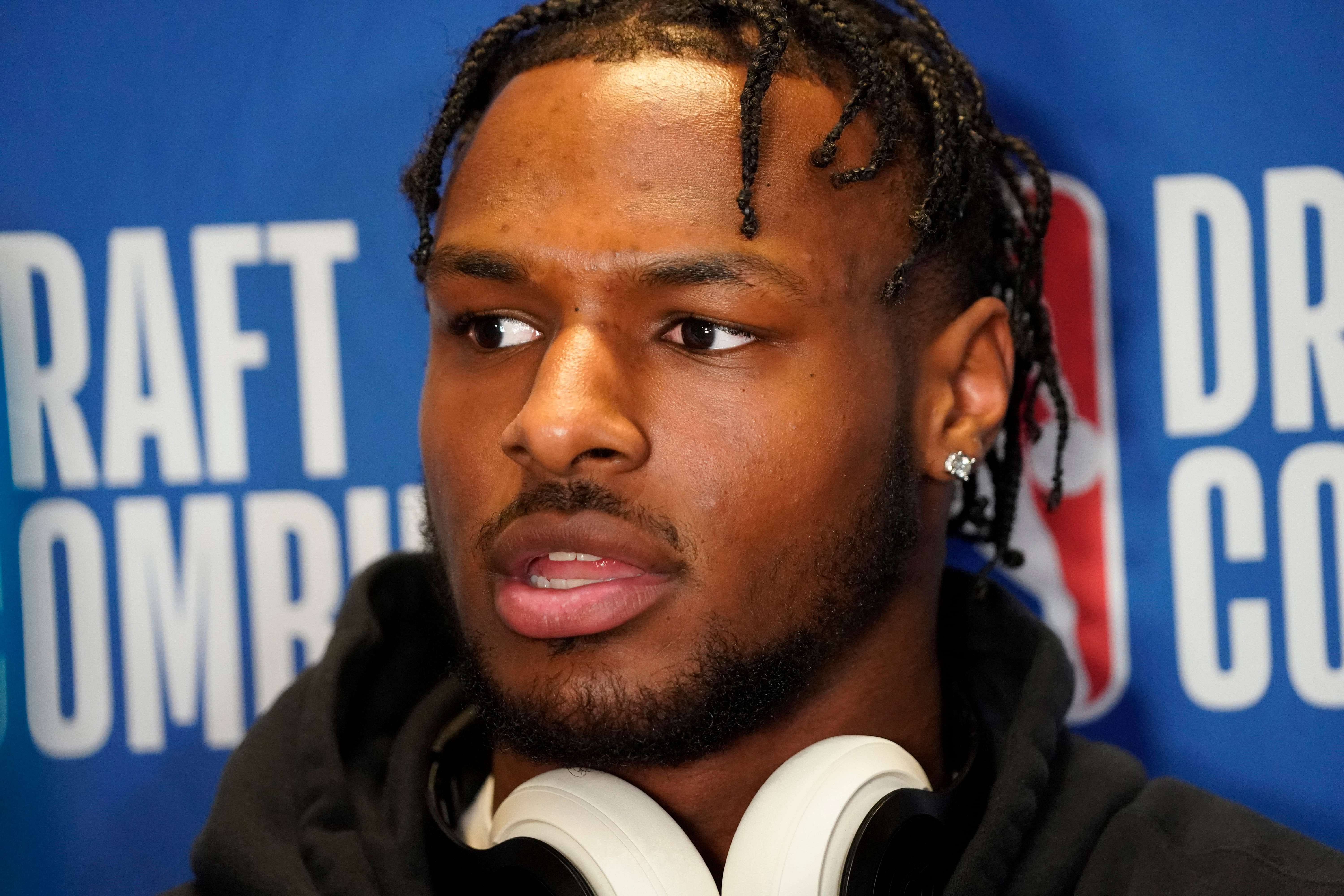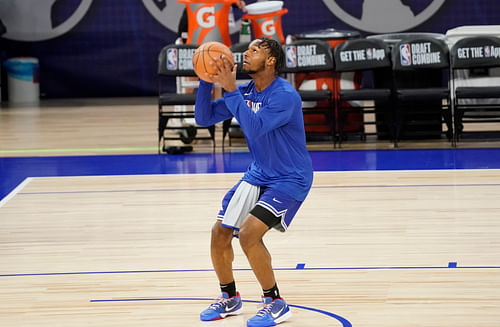
Is Bronny James a worthy NBA prospect? Dissecting why LeBron James' eldest son has garnered national media attention
The fanfare surrounding Bronny James will always be loud. He’s not only LeBron James’ son, though, as Bronny will exist in the basketball universe on his own merits. Though the expectations will always be immense, James has the tools to succeed in the NBA on his own merits.
Bronny James scouting report: Defensive savant but lacks offensive tools
Defense will be James’ main calling card in the NBA; James measured at 6’1 without shoes with a towering 6’7 wingspan. In a modern NBA where jumbo initiators are in vogue, there’s more room for guards with different specialties to thrive off the ball next to players like Luka Doncic, Nikola Jokic or Paolo Banchero.
James’ strength, long arms and lateral quickness allow him to lock up on the ball. He’s a relentless mover around screens, discarding picks with his lower body strength and attaching relentlessly. That agility lets James dip his shoulder and attach to ballhandlers, pressuring them out to the bucket. His motor is excellent in defending the ball, pushing defenders far out to reset the offense.
He’s a sharp off-ball defender as well, jumping passing lanes and moving his hands into passing lanes; James’ solid 2.2% steal rate reflects this. His hands move quickly on and off of the ball, jutting into windows on digs and on the ball. Though James isn’t much of a rim protector given his height, he’s willing to rotate down to protect the paint and offer resistance.
James can be a bit over-aggressive on defense, sometimes reaching for steals he shouldn’t and finding himself out of position. He’ll also foul on the ball, jumping into defenders at the point of attack and moving out of position to let ballhandlers by him or foul. This trait often improves as players age, but Bronny must maintain better control especially if defense is his calling card.

Part of James’ defensive appeal is his seamless fit into multiple defensive roles. We often think of the different offensive roles and positions players can occupy, though the same is true for defense. James can guard the ball in a lock-and-trail style defense, pressuring from behind with his length
He defends off-ball gunners as a chaser around screens and plays the weak side as a pass-lane defender. If Bronny improves as a rim defender, he might be able to add some shot-blocking value given his length and solid vertical leaping. That malleability will allow Bronny to slot into many systems, possibly boosting his appeal to teams.
Bronny James stats and player comparison
Most of the questions surrounding Bronny’s prospect case arise on offense — James averaged 4.8 points and 2.1 assists per game on a poor 47.2% true shooting and 26.7% from three. With those numbers, it’s easy to understand why some may dismiss Bronny as a prospect. Though digging deeper reveals some of James’ underlying offensive strengths.
There’s a history of low efficiency, low-scoring prospects (especially as young as Bronny) to improve as they age. Quentin Grimes, Norman Powell, Khris Middleton, Caris LeVert, Buddy Hield, Bruce Brown, Peyton Watson, Josh Richardson, Kyle Anderson and Herb Jones all averaged below 10 points per game on sub-50 % true shooting at a point in their college careers.
But scouts do fear his lack of per-game production. At a young age, stars do tend to show themselves as obvious and Bronny James did not. Some may have hoped for him to return to school to find a more prominent role and prove his worth before being drafted.
James’ feel for the game is above average, as he’s a positive decision-maker, as evidenced by his 2.0 assist-to-turnover ratio and a solid 1.17 assist-to-usage ratio. James whips the ball around the floor, frequently generating his teammates easy shots via extra passes. He’s a phenomenal transition/early offense passer, though he doesn’t flash high-level on-ball passing.
To succeed in the NBA, James must thrive as an off-ball shotmaker. His college shooting percentages, both from three and from the line (67.6%), don’t inspire tons of confidence. James took just 60 threes in his college career, though, not nearly enough to form a representative sample size.
While James struggled mightily in college as a catch and shooter, he shot a strong 43.8% on off-dribble jumpers this season. It’s common for young players to favor off-dribble jumpers, as many of them have played on the ball for most of their lives. James was a much stronger off-ball shooter in high school, though, adding optimism for future off-ball shooting development.
If James succeeds as an offensive player in the league, he must learn to shoot off the catch at a high clip. Scouts will worry about the shooting given his lack of proven strength at the college level. Some decision-makers in the league won’t trust the underlying indicators without seeing the results on the court first at a high level.
That shooting will enable James’ smart off-ball passing, cutting and foul drawing with his strength. Positive shooting lets James play off-ball next to other star-level initiators, adding value without the ball in the style of players like De’Anthony Melton and Alex Caruso.
On-ball creation is the biggest hole in James’ offensive projection, as he lacks the handle or burst to generate advantages by himself. He doesn’t have much experience running the offense or generating looks for himself or his teammates, especially without a screen. He struggles to blow by defenders as his handle is a bit loose and basic and his first-step explosion isn’t great. Bronny doesn’t have much of a scoring bag either, limited to basic pullups off of the dribble.
Final verdict on Bronny James
If James fails in the league, it will likely be due to his lack of a significant scoring threat. If he can’t pressure defenses as a scorer, they will play off of him and render his other skills less impactful and important.
It’s important to remember that James suffered cardiac arrest less than a year ago and is still recovering both physically and mentally from the event. That’s not to excuse any faults in his game, rather, to contextualize the situation James exists within.
There’s an ocean of pressure on James to succeed given his lineage. He’ll never be LeBron; that’s an impossible expectation. James, however, can thrive in the NBA on his own merits. He’s a deserving NBA draft prospect, who will likely take time to develop and mature into a positive contributor as most teenagers do.
Though there likely won’t be star upside due to his lack of creation and elite, special traits, there are sufficient qualities of a genuine pro. If James finds himself in a positive development environment willing to be patient, he will carve his own unique path as a valuable complementary piece on great teams for years to come.